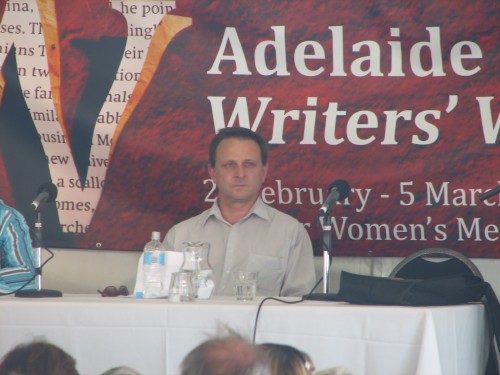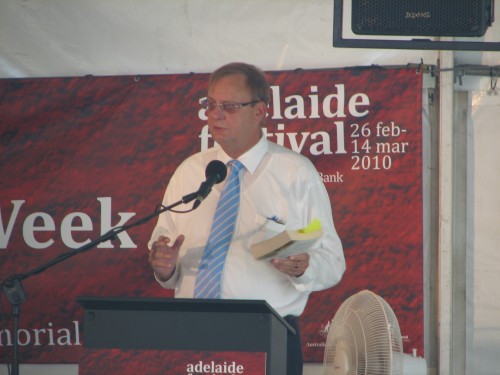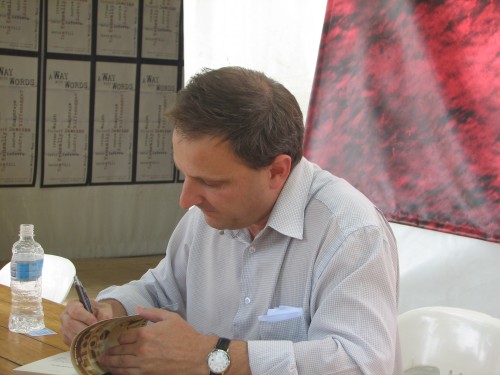A frustrating week of writing
I just had a very frustrating week of writing.
In fact, much of it has been devoted to non writing activities. First, I’ve had a series of meetings to attend and these always cut into my writing time.
Second, I’ve been busy tidying up the mess in our driveway. We had a massive storm here just over a week ago and a large 40 year old gum tree came down in our driveway. I’ve been busy chain sawing up the wood. I guess we’ll have plenty of firewood in the coming few years.
Third, I was discouraged by my critiquing group at a seminar last week and have hit a brick wall as a result. I was very excited about rewriting my novel in the first person. It seemed to be going so well, yet everyone was so critical and told me that it just wasn’t working.
Ouch.
Discouragement hit me big time. I’ve done no more on it for the last week. I sometimes feel like giving up.
Can any of my readers offer me any encouragement, or clues on how to get going again?
In the meantime – a few photos of the mess in my driveway.
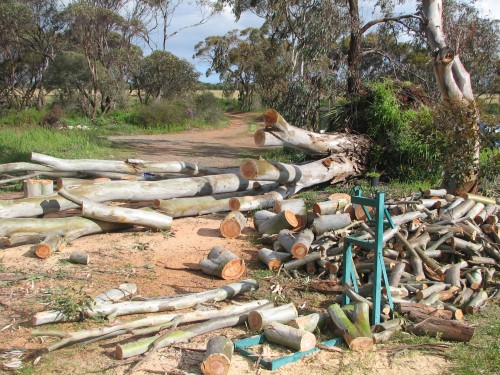
Fallen tree in our driveway
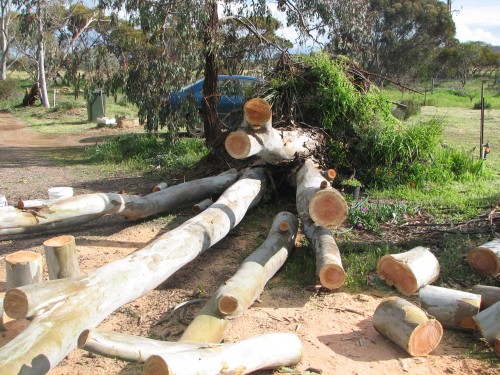
Fallen tree in our driveway
Book review: The Secret River by Kate Grenville

The Secret River
I’ve recently read Kate Grenville‘s novel The Secret River on the recommendation of a friend. I can’t recall if I’ve ever read any other works by this prominent Australian author, but will certainly be looking at her other books in the future.
The story begins in London and follows the story of William Thornhill, a boatman on the Thames. He is involved in a misadventure which lands him in jail and sentenced to hang. Fortunately his wife’s family has connections, and his sentence is commuted to transportation to Australia as a convict ‘for the term of his natural life.’ His wife and young family are allowed to travel on the same convict ship, but as free settlers in the new penal colony at Sydney.
The story grabs the reader as Thornhill and his family struggle to survive. After some years he gains his freedom. Through hard work and many setbacks they eventually establish a farm they think of as their own. The indigenous population see things much differently and the inevitable conflict arises. This is a dark and often tragic part of recent Australian history, the ramifications of which we are still attempting to work through.
Grenville has drawn some memorable characters, especially in Thornhill, his wife Sal and her longing to some day return home to London, and some of the minor characters living near them. Their daily endeavours are well documented, set against the ever present strangeness of the unfamiliar landscape. Grenville also carefully plots the growing problem they had with the local Darug people who had lived here at one with the environment for millennia.
Interestingly, this story was inspired by the author’s family history. Her great-great-great grandfather was Solomon Wiseman after whom Wisemans Ferry, near modern Sydney, is named. While the novel is fiction, the author has drawn heavily upon historical records of the day, including those of her family. Thus we have in the novel a blurring of the line between historical fact and an author’s imagination as expressed in the fiction of the story.
This blurring resonates with what I am attempting to do with my own work in progress, a children’s novel set in Nepal which draws on actual historical events.
The Secret River is an important work by a highly acclaimed Australian author. It has rightly won many awards, including:
- Winner, Commonwealth Writers’ Prize 2006
- Winner, NSW Premier’s Literary award 2006
- Shortlisted, Man Booker Prize, 2006.
Reference:
Grenville, K 2005. The Secret River. Text, Melbourne.
Book Review: Marrying Ameera by Rosanne Hawke
Released just this week, Marrying Ameera is the latest YA novel from award winning South Australian author Rosanne Hawke.
Whatever you read this year, put this novel on your MUST READ list.
Ameera, 17 years old, is the daughter of an Australian mother – a Christian – and a Pakistani father who is a devout Muslim. Seeking to be like her Australian friends, Ameera discovers that her father strongly and actively opposes any social contact with non-Muslims. He tightens his grip on her activities until he discovers her interest in a Pakistani Christian boy.
She is suddenly sent off to visit relatives in Pakistan thinking she is attending the wedding of her cousin Jamila. Soon after she arrives she discovers the awful truth: it is she who is marrying her wealthy cousin through a business transaction organised by her own father.
When her passport, return ticket and mobile phone are confiscated by her uncle, Ameera realises she is trapped. There seems no way out of going through with the wedding. Only her determination, courage and a growing love for Tariq can see her through this nightmare.
This is without doubt the best novel I’ve read this year, and the best YA novel in a long time. The author has drawn a wide range of believable and very memorable characters, all of them true to their particular culture, either Australian or Pakistani. I found the conflict experienced by the characters caught between two cultures as portrayed in Ameera, for example, to be both compelling and authentic.
Rosanne Hawke has used to great advantage the time she lived in Pakistan while teaching, and later on a fellowship while researching this novel. Her understanding of the Pakistani culture brings this story to life as she describes the customs, foods, clothing, ceremonies and even the elaborate jewellery used in weddings.
While this is a story which carries the reader along – a page turner – it also has a very serious message. The people living in countries like Pakistan still practice arranged marriages, and have done for centuries. This story is different. It portrays a forced marriage which is now illegal in Pakistan. Sadly, many forced marriages, in a range of countries, still occur. Few girls caught in such a situation don’t have the means to escape, or have the courage of the character Ameera to face the consequences of their plight.
This novel is a love story.
A tragic love story with just a touch of romance, romance shattered by reality. I believe, however, it is not a novel just for girls. Sure, it will appear to be most attractive to teenage girls, and they won’t be disappointed.
If I had my way however, I’d make this compulsory reading for every teenage male in Australia. There is so much they could learn about love, respect, honour and relationships. Besides – it’s an exciting read with danger abounding on every page.
References:
- Hawke, R, 2010, Marrying Ameera, Harper Collins, Sydney.
- Rosanne Hawke – click to go to her website.
- Reading guide to Marrying Ameera
Update: this book sold out in the first week after publication. It is about to go to a second print run. Fantastic.
Review: Nights in the asylum

Nights in the asylum
Book review: Nights in the asylum by Carol Lefevre
It was suggested by my supervising lecturer that I read this novel. Last week we had the author as the guest speaker at our regular fortnightly seminar. These are usually critiquing sessions where we try to help each other with the novels we are each writing for our Masters of Arts. Carol, a quietly spoken author talked to us for nearly two hours, going into details of how she went about the writing of this and her subsequent novel. I found her discussion on the inspiration of each work to be very interesting, and a major work can stem from a simple thing such as a photograph. Interestingly, my own idea for my current novel came from a photograph.
The word “asylum” in the title has great significance. All three main characters in the story are seeking a different form of asylum, mirroring the differing meanings of the word. Miri, the main character, is seeking sanctuary from the turmoil of a failed marriage and the death of a teenage daughter. Aziz, on the run after escaping from a detention centre, is seeking political asylum. Suzette and her baby are seeking refuge from an abusive, violent husband. All three are thrown together by circumstances into the same house in an unnamed mining town in outback Australia.
One of the most intriguing elements of this novel is the constantly shifting point of view. Each section or chapter (some are short, others quite long) is headed with a name of one of the characters, mostly the major three (but sometimes even minor characters for a few pages). Each section has the story told from the point of view of the character named in the title of the section. It sounds like a complicated way of writing, but it is wonderfully effective. By dipping into the heads of each character in depth like this we get a much deeper understanding of the particular mental turmoil and physical torments faced by that character. We also gain a greater understanding of and appreciation for how they perceive other characters in the story. A very clever technique and masterfully handled by the author. It is a technique I initially grappled with and rejected when writing my novel. I knew the pitfalls and knew my skills were not equal to the task. (Read more here.)
Another major element of the story worth mentioning here is a device known as the flashback. Many writers love this technique and it can be overused and used poorly. This author has used flashback to great effect, filling in details from the past and helping the reader to more fully understand each character’s strengths and weaknesses.
There are many other wonderful aspects of this novel and I can only touch on some briefly.
- The powerful mining town mentality of the townspeople comes through strongly.
- It is worth reading just for the beautiful use of language.
- The sense of isolation for all three main characters is a brooding presence throughout.
- A sense of the inevitability of the ending carries the reader along – not wanting it to happen, but resigned to the fact that it must end that way.
Overall, a brilliantly written work, told with compassion and finesse. And it’s an entertaining read as well.
Reference:
Lefevre, Carol, 2007, Nights in the asylum, Random House Australia, North Sydney
Stephen Orr at Adelaide Writers’ Week
One of the interesting book launches during this year’s Adelaide Writers’ Week was Stephen Orr‘s novel Time’s Long Ruin. Stephen is a high school teacher in Adelaide. He has had short fiction published in a range of magazines and journals and has had two previous novels published. They are Attempts to draw Jesus and Hill of Grace.
Time’s Long Ruin is set in Adelaide and deals with some of the darker elements of our society, including touching on the disappearance of the Beaumont children from Glenelg beach in 1966 and all done in a fictionalised form. I can’t give a review here yet as I haven’t read a page. I’m keeping it for a time when I can basically read right through. I will be interested in how he treats the topic as it could give me ideas on how to tackle the writing of a novel I have in mind.
The book was launched by the affable and outspoken Peter Goers, Sunday Mail columnist and ABC Radio 891 evening presenter. Peter did such a good sales job on the book that I raced to the Book Tent to buy it afterwards, and then joined the long queue to have my copy signed by the author.
I look forward to reading it.
